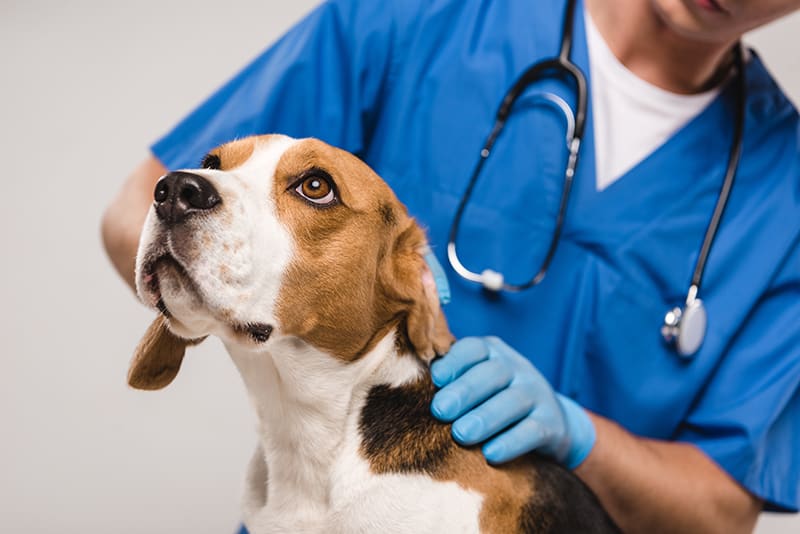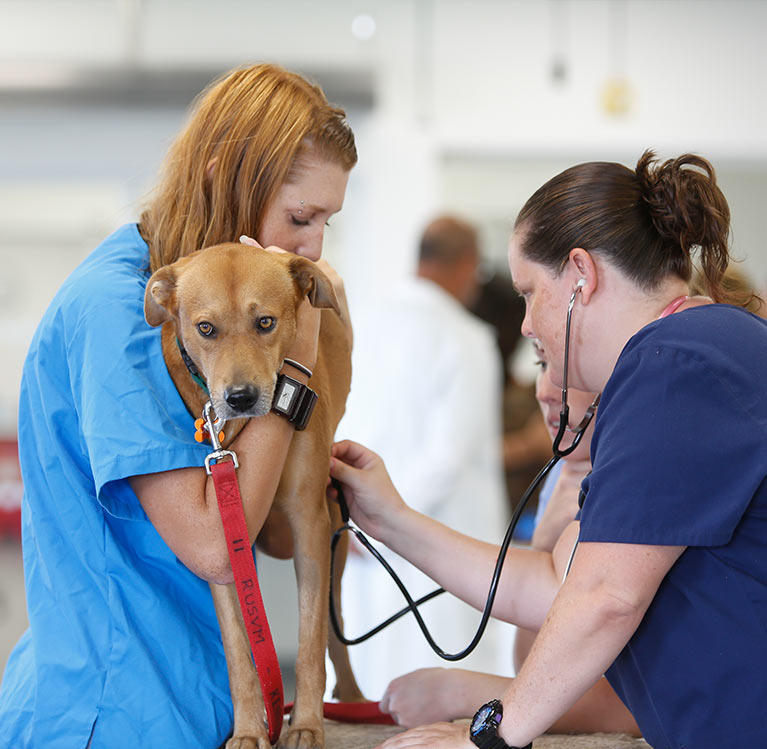Veterinary Cancer Specialist answers frequently asked pet cancer questions
Wiki Article
Comprehensive Guide to the Solutions Offered by a Veterinary Oncologist
Vet oncology encompasses a vast variety of services intended at treating and identifying cancer in family pets. Board Certified Veterinary Oncologist. Oncologists employ innovative diagnostic methods and offer different therapy options customized to each pet's demands. They likewise focus on supportive care and offer beneficial resources for family pet owners. Comprehending these solutions is crucial for making notified choices. What particular elements of vet oncology can notably impact a family pet's therapy journey?Comprehending Vet Oncology
Vet oncology is a specialized area concentrated on dealing with and detecting cancer cells in animals. This technique incorporates a wide variety of techniques, from clinical therapies such as chemotherapy and immunotherapy to medical interventions targeted at eliminating growths. Vet oncologists are trained to identify the one-of-a-kind manifestations of cancer in various types, enabling them to customize treatment plans to individual patients.Along with typical therapies, vet oncology emphasizes supportive care, which plays an important duty in boosting the top quality of life for damaged pets. This consists of discomfort monitoring, nutritional support, and palliative treatment alternatives. Cooperation with pet dog proprietors is crucial, as they are important to decision-making concerning their family pets' treatment paths. As research advancements, veterinary oncology remains to develop, providing new hope and improved end results for animals diagnosed with cancer. Overall, this area is essential for attending to the complexities of cancer in buddy animals.
Advanced Diagnostic Techniques
Advanced analysis methods play a vital function in vet oncology, providing critical understandings into the presence and level of cancer cells in animals. Imaging modalities such as ultrasound, CT scans, and MRI are commonly used to imagine tumors and analyze their attributes. Furthermore, biopsy procedures are vital for acquiring tissue examples, enabling clear-cut medical diagnosis and tailored therapy plans.Imaging Modalities Utilized
Imaging modalities play a crucial function in the medical diagnosis and administration of cancer in pets. Veterinary oncologists make use of different advanced imaging strategies to evaluate tumor size, transition, and presence. Radiography, or X-rays, offers an initial sight of bone and chest problems, while ultrasound provides real-time imaging of soft cells, permitting in-depth evaluation of interior body organs. Calculated tomography (CT) enhances visualization of intricate anatomical structures and allows 3D repairs, aiding in exact lump localization. Magnetic resonance imaging (MRI) is invaluable for soft tissue distinction, specifically in brain tumors. Additionally, nuclear medication methods such as positron exhaust tomography (PET) help determine metabolic activity within lumps. Collectively, these techniques improve analysis precision, leading effective therapy approaches for oncological patients.Biopsy Procedures Discussed
Complying with the preliminary evaluation via imaging modalities, obtaining a definitive diagnosis typically needs cells sampling via biopsy treatments. Vet oncologists use different biopsy methods based on the growth's place and qualities. Fine needle goal (FNA) is a minimally invasive method that extracts cells for cytological evaluation, suitable for superficial masses. Core needle biopsies provide larger cells examples and are valuable for deeper growths, allowing for histopathological analysis. Surgical biopsies involve excising a section or the whole lump, facilitating comprehensive assessment. These procedures not just confirm the presence of cancer cells yet likewise assist determine its kind and grade, assisting therapy choices. Each biopsy technique is chosen carefully to stabilize analysis precision with client safety and convenience.Therapy Alternatives for Cancer Cells in Pets
When a pet dog is diagnosed with cancer cells, a variety of therapy choices become offered to help boost and take care of the disease lifestyle. Veterinary oncologists normally recommend a multidisciplinary technique customized to the private animal's demands, which may include surgical procedure, radiation therapy, immunotherapy, or alternate treatments.Surgical procedure is frequently utilized to get rid of tumors and afflicted cells, possibly causing complete remission in many cases. Radiation treatment intends to ruin and target cancer cells, minimizing lump size and minimizing signs and symptoms - Veterinary Oncology Services. Immunotherapy uses the pet's immune system to eliminate cancer cells better, while different treatments could consist of acupuncture or herbal supplements to sustain overall health
Each treatment option brings its own benefits and dangers, and vet oncologists function very closely with pet dog proprietors to create a comprehensive plan that lines up with the family pet's certain medical diagnosis and the owner's desires. The supreme goal is to enhance the family pet's comfort and lifestyle throughout their cancer journey.
Chemotherapy for Pets
Chemotherapy is a typical therapy alternative for pet dogs detected with cancer cells and is typically utilized in conjunction with other treatments laid out by vet oncologists. This treatment involves the administration of specific medicines made to target and damage cancer cells, thus reducing growth size and preventing the spread of the condition. Vet oncologists tailor radiation treatment methods based upon the type of cancer, the pet dog's general health, and the wanted therapy outcome.Side effects can happen, as these medicines might also influence healthy and balanced cells. Common responses include nausea or vomiting, vomiting, and temporary changes in cravings - Pet Cancer Surgery. Vet oncologists are equipped to handle these negative effects properly, making sure the animal's convenience throughout the treatment procedure. Regular surveillance through blood examinations and follow-up consultations is vital to evaluate the pet dog's reaction to radiation treatment and make necessary modifications. Ultimately, radiation treatment can provide considerable advantages, enhancing the lifestyle for pets dealing with cancer cells diagnoses

Radiation Therapy in Veterinary Medication
Radiation treatment acts as a reliable treatment alternative for family pets diagnosed with local growths, providing a targeted strategy to cancer management. This method utilizes high-energy radiation to harm the DNA of cancer cells, inhibiting their capacity to proliferate. It is particularly helpful for tumors that are not responsive to surgical elimination or for cases where surgery might not be possible as a result of the read what he said tumor's area.Veterinary oncologists tailor radiation protocols based upon tumor kind, area, and size, as well as the family pet's overall health and wellness. Treatment can be supplied via outside light beam radiation or brachytherapy, each with distinct advantages. Normally, multiple sessions are needed to make best use of effectiveness while lessening side effects.
Although animals might experience temporary reactions such as skin inflammation, the total aim is to shrink growths and ease signs and symptoms, eventually enhancing the pet dog's diagnosis and lifestyle. As necessary, radiation treatment plays an essential role in extensive cancer cells treatment.
Palliative Treatment and High Quality of Life
Palliative treatment in vet oncology concentrates on improving the lifestyle for pet dogs encountering incurable health problems, making sure convenience and dignity in their final days. This specific technique prioritizes pain monitoring, signs and symptom control, and emotional support. Vet oncologists assess each pet's individual demands, customizing interventions to reduce discomfort and boost total health.Methods may consist of providing medicines for pain alleviation, managing nausea or vomiting, and resolving various other upsetting symptoms. Furthermore, nutritional assistance is frequently offered to keep stamina and improve appetite. The emotional aspect of palliative treatment is similarly essential; developing a calm environment assists decrease anxiousness for both pet dog and owner.
Inevitably, the goal of palliative treatment is to enable pet dogs to enjoy their continuing to be time with as much happiness and dignity as feasible. By concentrating on convenience and quality of life, veterinary oncologists play an important duty in ensuring that pet dogs and their households browse this challenging trip with concern and understanding.
Support for Family Pet Owners During Therapy

Psychological Guidance for Proprietors
Charting the emotional landscape throughout an animal's cancer cells treatment can be a frustrating experience for owners. The uncertainty bordering diagnosis and diagnosis can result in sensations of helplessness, stress and anxiety, and despair. Vet oncologists recognize the value of emotional support and often offer advice to help owners navigate this tough trip. Communication is crucial; discussing treatment choices and possible end results can reduce some concerns. In addition, supplying peace of mind that psychological feedbacks stand fosters an you can check here encouraging setting. Many oncology clinics may likewise suggest support system or counseling services tailored for family pet proprietors, promoting common experiences. Urging proprietors to focus on self-care throughout this moment is crucial, as their psychological wellness straight influences their pet's comfort and overall treatment experience.
Resources and Educational Products
Steering through the intricacies of a family pet's cancer cells treatment can be intimidating for proprietors, making accessibility to academic materials and dependable sources crucial. Vet oncologists frequently provide a selection of handouts, pamphlets, and online materials that explain treatment options, possible negative effects, and care approaches. These resources help debunk the procedure and equip pet dog owners to make enlightened decisions. In addition, lots of oncology centers supply access to sustain online forums and teams where owners can attach with others dealing with similar difficulties, cultivating a sense of area. Educational webinars and seminars conducted by veterinary professionals even more boost understanding, guaranteeing that proprietors are well-equipped to navigate their pet dog's journey with cancer treatment with self-confidence and knowledge.Often Asked Inquiries
How Can I Prepare My Family Pet for a Vet Oncology Go To?
Preparing a pet dog for a veterinary oncology check out entails gathering medical documents, keeping in mind signs and symptoms, and guaranteeing the pet dog fits. A calm attitude and acquainted items can assist alleviate anxiousness throughout the appointment.What Are the Indications My Pet Dog May Have Cancer Cells?
Signs that an animal might have cancer cells consist of inexplicable weight reduction, consistent vomiting or looseness of the bowels, uncommon swellings or swellings, sleepiness, changes in appetite, trouble breathing, and changes in actions. Prompt vet attention is important.How Can I Support My Animal Mentally Throughout Therapy?
Supporting an animal mentally during treatment involves providing convenience, maintaining regimens, using mild affection, and making certain a calm atmosphere. Engaging in silent play and normal friendship assists ease anxiety and cultivates a feeling of protection.Exist Different Therapies for Animals With Cancer cells?
Alternative treatments for pets with cancer cells consist of acupuncture, herbal therapies, and dietary support. These approaches may complement conventional therapies, promoting total health. Consulting with a additional hints veterinarian is important for efficient and safe assimilation of alternate therapies.What Prices Should I Anticipate for Vet Oncology Solutions?
The anticipated prices for veterinary oncology solutions can differ considerably, usually influenced by diagnostics, therapies, and continuous treatment. Family pet owners need to get ready for expenditures ranging from consultations to specialized treatments, mirroring the complexity of cancer cells administration.Collaboration with family pet owners is vital, as they are essential to decision-making concerning their pets' therapy courses. Each treatment choice lugs its own benefits and threats, and veterinary oncologists work very closely with animal proprietors to make a complete plan that lines up with the pet dog's specific medical diagnosis and the proprietor's wishes. Family pets may experience momentary responses such as skin irritation, the general purpose is to shrink growths and ease symptoms, ultimately boosting the animal's prognosis and high quality of life. Assistance for pet dog owners during therapy is important in guiding through the emotional difficulties connected with a family pet's cancer cells medical diagnosis. Preparing a pet for a veterinary oncology check out involves celebration clinical documents, noting symptoms, and guaranteeing the pet dog is comfy.
Report this wiki page